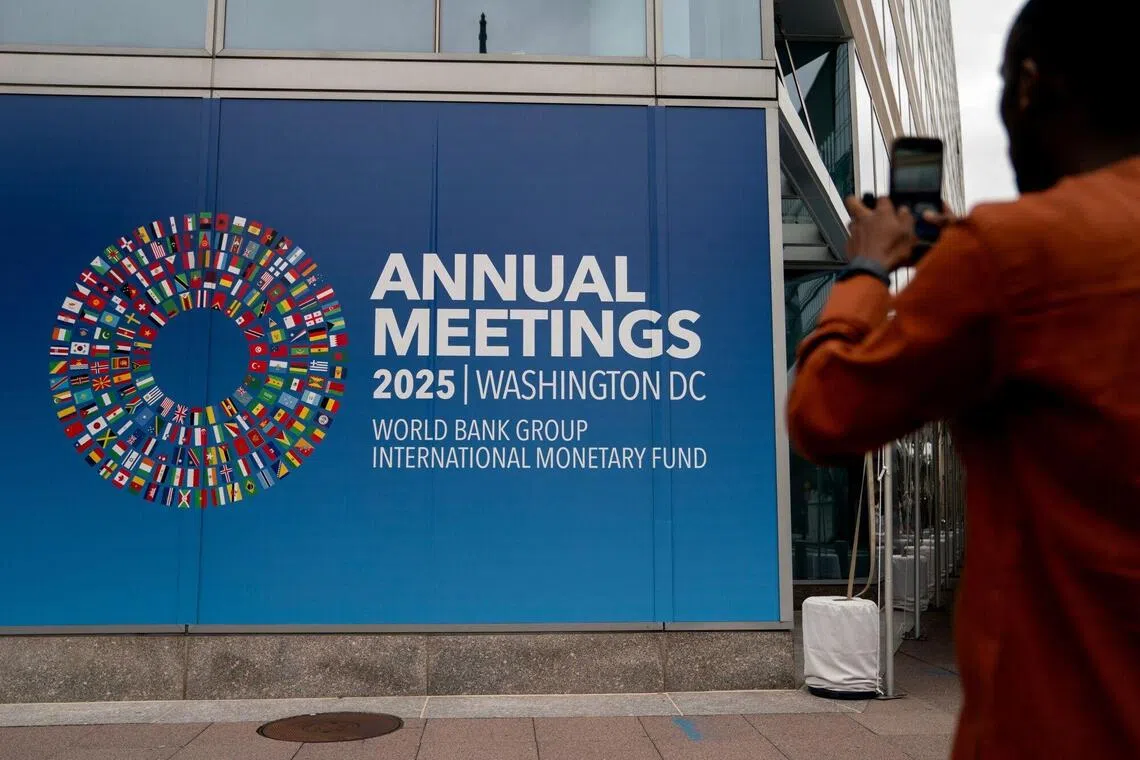Stock bubble dread grips world’s central bankers meeting in Washington
Sign up now: Get ST's newsletters delivered to your inbox

Central bankers meeting in Washington this week will collectively confront a new worry this week: the danger of a market crash.
PHOTO: BLOOMBERG
Follow topic:
FRANKFURT - Central bankers, already uneasy about trade tensions and swelling public debt, will collectively confront a new worry this week: the danger of a market crash.
Global policymakers and finance ministers will gather in Washington for the International Monetary Fund/World Bank fall meetings on Oct 13 to 18, after a chorus of warnings that a stock bubble focused on artificial intelligence companies might burst before long.
Dr Kristalina Georgieva, the fund’s managing director, acknowledged the financial stability risk in a speech on Oct 8 that previewed topics for discussion in the coming days.
“Valuations are heading towards levels we saw during the bullishness about the internet 25 years ago,” she said. “If a sharp correction were to occur, tighter financial conditions could drag down world growth, expose vulnerabilities, and make life especially tough for developing countries.”
Her warning was arguably more forthright than the IMF’s commentary from the October 2000 meeting, when its World Economic Outlook (WEO) described “still high” equity valuations and the potential for imbalances to unwind “in a disorderly fashion”. Within months, the sell-off momentum was such that the Federal Reserve was forced to deliver an emergency half-point interest-rate cut.
Even before US President Donald Trump’s renewed China tariff threat tanked stocks on Oct 10, officials saw alarming parallels. The Bank of England just warned of the risk of a “sharp market correction”, European Central Bank (ECB) policymakers worried aloud, and the Reserve Bank of Australia in October also noted vulnerabilities.
Such concerns have been mounting for a while. ECB officials were presented with the warning of “sudden and sharp price corrections” at their last policy meeting more than a month ago, while Fed chair Jerome Powell observed in September that markets are “highly valued.”
Fast forward to the coming week, and the IMF’s Global Financial Stability Report – a publication that did not even exist back in 2000 – may draw more attention than usual on Oct 14. The latest WEO, with economic forecasts for the world, will also be released on the same day.
Statements from Group of Seven or Group of 20 ministers attending the IMF gathering will also be scrutinised, as will the cacophony of policymakers likely to share their views.
Mr Tom Orlik, global chief economist for Bloomberg Economics, said: “Artificial intelligence might be a bubble. It is also a juggernaut. The IMF is doubtless correct to warn that valuations are stretched. More doubtful – whether those warnings register with investors gripped by fear of missing out.”
Meanwhile, the prospect of a revived trade war between Beijing and Washington will focus investors and policymakers.
Mr Trump on Oct 10 announced an additional 100 per cent tariff on China as well as export controls on “any and all critical software” beginning on Nov 1, hours after threatening to cancel an upcoming meeting with Chinese President Xi Jinping. That came after China added new port fees on US ships, started an antitrust investigation into Qualcomm and unveiled sweeping new curbs on its exports of rare earths and other critical materials.
China’s Ministry of Commerce said the US should stop threatening it, and urged more negotiations on outstanding issues to agree on a trade deal.
Speaking on Fox News’ Sunday Morning Futures, Vice-President J.D. Vance said the US has more leverage in the escalating dispute, saying the Trump administration is ready to be reasonable if Beijing is. Mr Trump later posted a statement that hinted at a possible off-ramp for Mr Xi while issuing a veiled threat that a full trade war would wound China. BLOOMBERG

